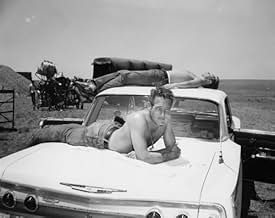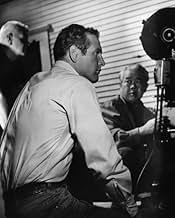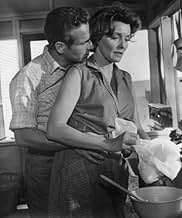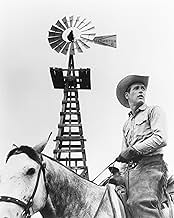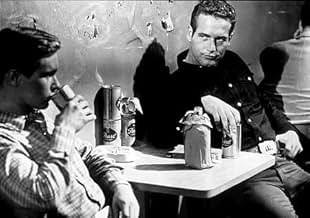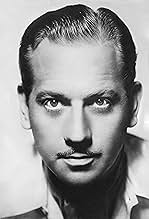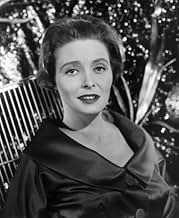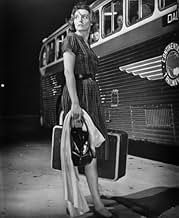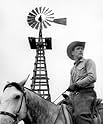Cette histoire a pour cadre un vieux ranch texan à l’abandon, où se déchirent un vieux père aux principes rigides (Melvyn Douglas), son fils rebelle et insensible (Paul Newman) et leur troub... Tout lireCette histoire a pour cadre un vieux ranch texan à l’abandon, où se déchirent un vieux père aux principes rigides (Melvyn Douglas), son fils rebelle et insensible (Paul Newman) et leur troublante gouvernante (Patricia Neal).Cette histoire a pour cadre un vieux ranch texan à l’abandon, où se déchirent un vieux père aux principes rigides (Melvyn Douglas), son fils rebelle et insensible (Paul Newman) et leur troublante gouvernante (Patricia Neal).
- Réalisation
- Scénario
- Casting principal
- Récompensé par 3 Oscars
- 17 victoires et 17 nominations au total
- Lonnie Bannon
- (as Brandon de Wilde)
- Myra
- (as Sharon Hillyer)
- Proprietor Sweeping Glass
- (non crédité)
Avis à la une
Exciting and thought-provoking clear-eyed story of growing in Texas plenty of interesting drama , emotion and a strong antagonism between the free-drinking son and a sternly moralising patriarchal ranch owner , including elements of Greek tragedy . Various studio-characters furnish the basis for this Western-drama ; filmmaker Martin Ritt has got a big success in delineating their troublesome roles . Terrific Paul Newman in an enjoyable performance, though using the Stanislawski method , it results to be a superb piece of acting . Paul Newman played the part of Hud as a villain . He was later stunned that so many young moviegoers had a poster of Hud and viewed him as their hero. In preparation for his title role , Paul Newman worked on a Texas cattle ranch for several weeks acquiring genuine calluses and a cowboy's lope . Melvyn Douglas gives a superb acting as old rancher who has fallen on hard times and shows to mourn the old-free-ranging ways of the frontier days . Terrific interpretation by Patricia Neal as a mature woman to whom Hud pursues and she wants nothing to do with him . Interesting screenplay dealing with brooding themes such as the disintegration of a heritage , including engaging dialogs haunted by frames of decay and death ; being nicely written by Irving Ravetch and Harriet Frank Jr. from a novel by Larry McMurtry . Evocative cinematography by James Wong Howe , he's a classic cameraman who won two Oscars (for Hud, and Rose tattoo), working from silent cinema . Elmer Bernstein's score for Hud runs approximately six minutes, making it one of the shortest film scores ever. But what a six minutes it is - in fact, it's perfection and just right for the film . The music is sparse, yes, but it's potent every time it appears. There's also some source music in the film - car radios, jukeboxes, records.
This understatement motion picture was well produced and directed by Martin Ritt, who worked with Paul Newman in two Westerns : ¨Hombre¨ and ¨Outrage¨. Ritt was an expert on dramas such as ¨Stanley and Iris¨ , ¨Nut¨ , ¨Norma Rae¨ , ¨The front¨, ¨The Sound and the Fury¨ , ¨Black orchid¨ , though also directed films of all kind of genres such as : ¨The Spy Who Came in from the Cold¨ , ¨The Great White Hope¨ , ¨Mafia¨ and ¨Molly McGuire¨ . This ¨Hud¨ film will appeal to drama enthusiasts and Paul Newman fans . Rating : Above average, well worth watching ; along with ¨Outrage¨ , being one of Ritt's best movie.
**** (out of 4)
One of the bleakest films ever made, HUD centers on the title character played by Paul Newman who is about as ruthless as one can be. He cares for very little in this world and everything he does love is usually something bad. His father (Melvyn Douglas) has hated him for some time now but after their cattle grows sick they begin to butt heads.
HUD certainly isn't a very cheerful film and it's one of the darkest and in reality sadness movies ever made. While it's not always easy to watch there's no denying its impact plus the fact that it contains three of the greatest performances that you're ever going to see. HUD works on many levels but it's strength is certainly the performances as well as its honest character study of someone most people will find cool but when you get pass all the smoke you see a rather ugly human being.
The screenplay itself is extremely laid back and in fact the film is pretty quiet. There's not too much screaming or long speeches but instead there's just a very realistic tone that comes across quite natural and real. I think most people will be able to look at these main four characters and either be one of them are know someone like them. There's the young cool guy who hurts everything that he comes into contact with. There's the older wise man who stands by his morals. There's a broken house maid who is probably hiding some sadness. Then there's the young nephew who looks up to Hud not knowing or understanding his type of character.
Then, there are the terrific performances, which are among the best you'll ever see. Newman never had an issue playing cool but he always made it look so easy. He brings that quality to Hud but there's also that underlying dirty and dangerous part. There's just a certainly coldness that Newman brings to the character, which we never saw from him in his other roles. Douglas rightfully won the Best Supporting Actor Oscar for his deep and very sincere performance. Neal is a great big ball of sadness and her deep eyes just say so much without her having to speak a word. Even Brandon De Wilde is very impressive in his role and especially when you consider the major talent he was acting against.
HUD also features a terrific and haunting music score and the Oscar-winning cinematography perfectly captures the dusty dirt roads. The film manages to keep getting better with time as its messages are perhaps more true today than when the film was originally released.
Hud is an amoral and unemotional rancher. He, very often, comes into a conflict with his father, which has a negative impact on his young nephew. His father holds Hud responsible for the death of his other son. He tries to imbue his grandson with a sense of decency and responsibility to others. When their cattle fall ill, the conflict between father and son begins to escalate...
The Texas cow country is represented through a discord in a family. It's nothing new, but a realistic approach is enriched with dose of a sick materialism and immorality, which is probably the biggest asset of this film. This is a cold review of one human mind, which rejects any kind of traditional values. Characters is placed on the scale several times, but it is clear that there is no winner. One thing is certain, this is not a conflict between traditional and modern ways of thinking.
The scenery is a kind of combination between a poor ranch and cheap city. The atmosphere is grim and tense. Characterization is very good.
Paul Newman as Hud Bannon is a restless, arrogant and ambitious rancher. He is a man, who has fallen into a trap of modern understanding of life around him. He, at the same time, understands and despises the people around him. Mr. Newman is a charming monster in this film.
Melvyn Douglas as Homer Bannon is a traditional farmer who loves his ranch and cattle more than his own son. He is an old man who sees his own disappointment and shame in actions and behavior of his son. Mr. Douglas has offered a very touching performance.
Brandon deWilde as Lonnie Bannon is a young man who is torn with relationship between his venerable grandfather and his harsh and greedy uncle. He is naive, sensitive and, perhaps, sexually depressed. Patricia Neal as Alma Brown is a lonely housewife with a broken heart and a strong dignity. Ms. Neal has almost stole this show.
The vast, desolate "Lone Star" landscape has often inspired potent Hollywood screen-writing (witness "Giant," and "The Last Picture Show"). 1963's "Hud" is no exception. The story focuses around a bored, aimless, arrogant ne'er-do-well whose utter contempt for humanity threatens to denigrate and destroy all those exposed to it. Thrust in a dusty, dried-up, decaying Texas cattle town (awesomely photographed in black-and-white by Oscar-winning cinematographer James Wong Howe), the story bears down assertively on its straightforward themes of nihilistic youth and misguided hero worship.
Paul Newman was awarded an Oscar - but not for "Hud." He took home the award much later for his performance in 1987's "The Color of Money" but for me it was a restitutive pat on the back for his probing, higher-calibre work here in "Hud," among others. Newman gives an assured, excitingly reckless performance, the creme of the crop of earlier, jaunty perfs. All swagger and bluff, reeking with cocky sexuality, Hud Bannon is the personification of cool, callous cynicism at its most reprehensible...and alluring. The world is this cowboy stud's oyster. He takes what he wants, whenever he wants it - whether its coveting his father's land or coveting another man's wife, whether its peddling sick cattle on others or peddling his ethics on a susceptive boy - it's all at the core of a dangerously irresponsible life's dogma. A loser's warped vision of winning. It was a risky star performance for Newman as Hud has no redeeming qualities whatsoever, but the actor plays out his acting cards brilliantly and winds up with a royal flush.
Newman is bolstered by a choice cast. Dusky-voiced Patricia Neal, whose looks had begun to harden by this time, is fascinating as the forlorn, slovenly housekeeper Alma who has her careworn hands full just keeping the lustful, roving Hud in line. Hud (and the audience) is perked by her stifled but not yet snuffed out sensuality, as she wisely avoids the obvious come-ons tossed her way. Making relative peace with her lonely, desultory existence, Alma has overcome a difficult past and find a sense of being as the makeshift homemaker to an aging rancher/widower (Melvyn Douglas) while tending to his impressionable grandson (Brandon de Wilde), instilling in the boy some good old-fashioned sense and motherly attention when necessary. Neal is top-notch especially in her final scenes and quite deserved her Oscar.
Oscar-winning Douglas is superb as Hud's upstanding, uncompromising father, a cattle man in the twilight of his years. Chocked full of conventional wisdom and righteous indignation, the prideful old-timer may or may not have contributed to his son's acute moral letdown, having given up on him as a "bad seed" long ago. Their confrontational scenes are pocked with harsh accusations and bitter conflict - never to be resolved. De Wilde, in a coming-of-age extension of his memorable "Shane" role, again portrays the embodiment of idolizing youth as the teenage Lon. Drawn to the brawling, good-looking "outer package" of his older Uncle Hud, deWilde is touching as his character gradually wises up to the realization that this superficial "package" is damaged goods, while those nearest and dearest to him fall by the waste side.
A near-classic to be sure. The performances alone make this a not-to-be-missed item.
Le saviez-vous
- AnecdotesPatricia Neal was particularly proud of one unscripted moment that made it into the film. While talking to Hud about her failed marriage, a huge horsefly flew onto the set. Just as she says she's "done with that cold-blooded bastard," she zaps the fly with a dish towel. Martin Ritt loved it and printed the take.
- GaffesIn the first scene, you can see the cameramen and tripod of the cameras in the window of the store.
- Citations
Homer Bannon: Lonnie, little by little the look of the country changes because of the men we admire. You're just going to have to make up your own mind one day about what's right and what's wrong.
- ConnexionsFeatured in The 40th Annual Academy Awards (1968)
- Bandes originalesThe Great Titanic (It Was Sad When That Great Ship Went Down)
(uncredited) (ca 1915)
American folk song
Sung a cappella by Paul Newman and Brandon De Wilde
Meilleurs choix
- How long is Hud?Alimenté par Alexa
Détails
Box-office
- Budget
- 2 500 000 $US (estimé)
- Durée
- 1h 52min(112 min)
- Couleur
- Rapport de forme
- 2.39 : 1


